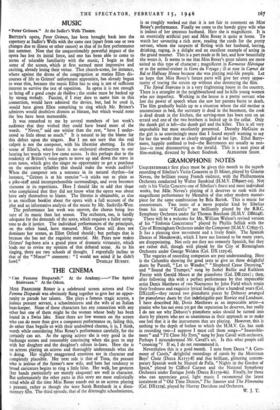THE CINEMA
" Une Femme Disparait." At the Academy.—" The Spiral Staircase." At the Odeon.
MISS FRANCOISE ROSAY is a celebrated screen actress and Une Femme Disparait was obviously flung together to give her an oppor- tunity to parade her talents. She plays a famous tragic actress, a jealous peasant servant, a schoolmistress and the wife of an Italian boat-keeper. None of these characters has any connection with any other but one of them might be the woman whose body has been found in a Swiss lake. Since there are few women on the screen who can do more than give a competent performance or, failing this, do other than beguile us with their undoubted charms, it is, I think, worth while considering Miss Rosay's performance carefully, for she certainly can act. As the ageing actress she is very good in the backstage scenes and reasonably convincing when she goes to stay with her daughter and the daughter's odious in-laws. Here she is an actress playing an actress and thoroughly understands what she is doing. Her slightly exaggerated emotions are in character and completely plausible. Her next role is that of Tona, the peasant who is jealous of the farmer's new wife, and here her tendency to broad caricature begins to ring a little false. Her walk, her gestures (her hands particularly are mutely eloquent) are well in character. But unfortunately the other parts in this story are most realistically acted while all the time Miss Rosay stands out as an actress playing a peasant, rather as though she were Sarah Bernhardt in a docu- mentary fifm. The third episode, that of the distraught schoolmistress, is ,so roughly worked out that it is not fair to comment on Miss Rosay's performance. Finally we come to the bawdy gipsy wife who is jealous of her amorous husband. Here she is magnificent. It is an essentially artificial part and Miss Rosay is quite at home. To watch her savouring a rich stew, reading the cards for the pretty servant, whom she suspects of flirting with her husband, leering, drinking, raging, is a delight and an excellent example of acting in the grand manner. This is a part made to fit her, and how beautifully she wears it. It seems to me that Miss Rosay's great talents are more suited to this type of character ; magnificent in Kermesse Heroique or as the animal-trainer in Gens du Voyage ; ill at ease in Carnet de Bal or Halfway House because she was playing real-life people. Let us hope that Miss Rosay's future parts will give her every oppor- tunity of tearing the screen up without also destroying the film.
The Spiral Staircase is in a very frightening house in the country. There is a strangler in the neighbourhood and he kills young women who are imperfect. Working in the house is a pretty servant who lost the power of speech when she saw her parents burnt to death. The film gradually builds up to a situation where the old mother is unconscious in bed, the secretary is dead in the basement, the cook is dead drunk in the kitchen, the serving-man has been sent on an errard and one of the two brothers is locked up in the cellar. Only the dumb girl is left—the dumb girl and the killer. This is all very improbable but most excellently presented. Dorothy McGuire as the girl is so convincingly mute that I found myself wanting to say for her the words that so clearly struggled at her lips. Ethel Barry- more, happily confined to bed—the Barrymores are usually so rest- less—is most disconcerting as the invalid. This is a neat piece ol
film-making, directed by Robert Siodmak. ALEXANDER SHAW.


























 Previous page
Previous page